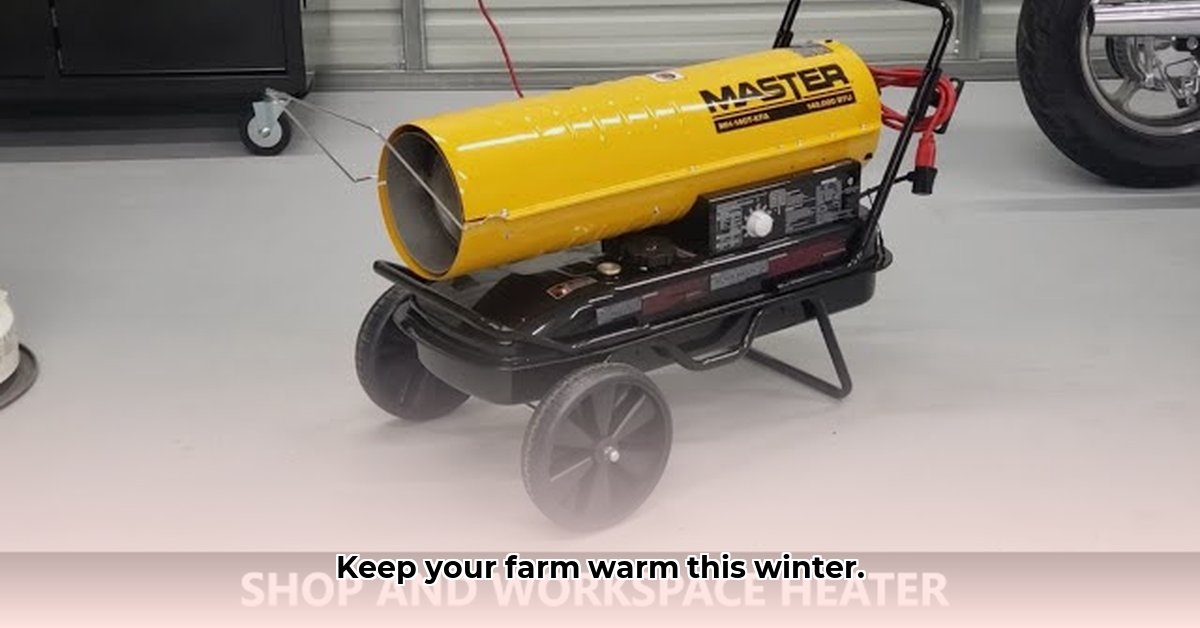
Winter's harsh grip on your farm doesn't have to mean sky-high energy bills or a hefty carbon footprint. Choosing the right shop heater from Tractor Supply can make all the difference in keeping your animals warm, your workspace comfortable, and your environmental impact minimal. This guide compares propane, electric, and biomass heating options (if available) to help you find the perfect fit for your farm. For additional heating solutions, check out this helpful resource.
Shop Heaters at Tractor Supply: A Comparative Guide
Selecting the ideal shop heater requires careful consideration of several factors. Let's break down the process to ensure you make an informed and sustainable choice.
Assessing Your Heating Needs: A Step-by-Step Approach
Before browsing Tractor Supply's selection, assess your specific heating demands. This planning prevents costly mistakes and ensures you get the right heater the first time.
- Structure Size: Measure the area you need to heat. A small workshop demands a smaller heater than a large barn. Accurate measurements are crucial for correct BTU (British Thermal Units - a measure of heat energy) calculation.
- Climate: Harsh winters require more powerful heaters than mild ones. Consider your average winter temperatures and the level of insulation in your buildings.
- Livestock Needs (if applicable): Different animals have varying temperature requirements. Research the ideal temperature range for your livestock to ensure their well-being.
- Budget: Factor in both the initial purchase price and ongoing fuel or electricity costs. Some heaters may have low initial costs but high running expenses.
- Fuel Accessibility: Propane heaters need easily accessible propane supplies and storage. Electric heaters rely on reliable electricity, while biomass heaters (if available) necessitate a supply of wood pellets.
Exploring Your Options: Types of Shop Heaters
Tractor Supply offers a variety of shop heaters. Let's delve into the pros and cons of each type, focusing on sustainability and cost-effectiveness.
1. Propane Heaters: Powerful and Portable
- Function: These heaters burn propane gas to generate intense heat. Many models are portable, offering flexibility.
- Pros: Powerful heating, suitable for large spaces, and portable for easy relocation.
- Cons: Requires a consistent propane supply and tank storage. Produces greenhouse gas emissions and poses a carbon monoxide risk if not properly ventilated. Running costs can be significant depending on propane prices. Not the most sustainable option long-term.
- Tractor Supply Link: [Insert Tractor Supply Propane Heater Link Here]
2. Electric Heaters: Clean and Convenient
- Function: These heaters convert electricity into heat, often with a fan for air circulation.
- Pros: Clean operation, generally safer than propane, and many models offer precise temperature control via thermostats.
- Cons: Running costs can be substantial, depending on electricity prices and usage. May not be suitable for very large or poorly insulated spaces.
- Tractor Supply Link: [Insert Tractor Supply Electric Heater Link Here]
3. Biomass Heaters (If Available): A Greener Solution
- Function: (Only include if Tractor Supply offers biomass options). These heaters burn biomass fuel sources like wood pellets to produce heat.
- Pros: Potentially more cost-effective and environmentally friendly than propane, depending on pellet sourcing and costs.
- Cons: Require consistent fuel sourcing and storage. Can be messier to clean and might produce emissions, though usually less than propane. High initial investment cost.
- Tractor Supply Link: [Insert Tractor Supply Biomass Heater Link Here, if applicable. Otherwise, remove this section]
A Comparative Analysis: Cost and Sustainability
Choosing the right heater requires comparing costs and environmental impact. The following table summarizes key differences:
| Heater Type | Initial Cost | Running Cost | Sustainability | BTU Output Range (Example) | Pros | Cons |
|---|---|---|---|---|---|---|
| Propane | $100 - $500 | Moderate to High | Low | 30,000 - 100,000 BTU | Powerful, portable, fast heating | Greenhouse gas emissions, CO risk, requires refills, and tank storage |
| Electric | $50 - $300 | Low to High | Moderate | 1,500 - 15,000 BTU | Clean, safe, precise temperature control | High running costs (electricity dependent), may lack power for large spaces |
| Biomass (if applicable) | $300 - $1000 | Moderate to Low | Moderate to High | 20,000 - 80,000 BTU (example) | Potentially cost-effective, environmentally friendly | Requires fuel storage, maintenance, and ash removal; high initial cost |
Note: Costs are estimates and vary based on model and location.
Installation and Maintenance: Ensuring Safety and Efficiency
Always follow manufacturer instructions for safe installation. Regular maintenance is key to longevity and efficiency.
- Propane: Regularly inspect for leaks and ensure adequate ventilation to prevent carbon monoxide buildup.
- Electric: Clean filters to maintain efficiency. Check wiring regularly.
- Biomass: Clean ash regularly to prevent hazards and maintain optimal performance. Ensure adequate ventilation.
Making Your Decision: The Final Steps
Your ideal heater depends on your specific needs and budget. Consider these crucial factors:
- BTU Output: Ensure the heater's BTU output matches the space's heating requirements.
- Long-Term Costs: Evaluate both initial and ongoing expenses for a complete cost picture.
- Environmental Impact: Prioritize cleaner-burning options whenever feasible.
- Ease of Maintenance: Choose a heater that's easy to maintain to minimize downtime.
Consult with Tractor Supply staff for personalized recommendations. This guide provides general information; always consult manufacturer instructions for your specific heater model. Remember, research and exploration of new sustainable heating technologies are ongoing processes.